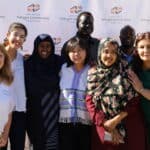It’s not easy to serve a community without a good support system. This can be especially true for leaders of ethnic community–based organizations (ECBOs). The Office of Refugee Resettlement (ORR) defines an ECBO as “a non-profit organization that was founded and is led by a current or former refugee, or a group of current and former refugees and immigrants, primarily for the advancement of refugees.” ECBOs may face specific challenges that are difficult to deal with alone, such as helping members of their communities adjust to a completely new culture and ensuring their organization reflects and is represented by the voices and values of the community they serve. That’s where the support of a community of practice (CoP) can help. At Switchboard’s first ECBO CoP meeting on June 27, leaders from 32 different organizations joined to discuss what they are proud of in their work and what challenges they face as ECBO leaders. It’s little surprise that many common themes emerged. In this blog post, we share key takeaways.
What are CoPs and Why are They Important?
“Communities of practice” is a term created and defined by Etienne and Beverly Wenger-Trayner, and it is used to describe “groups of people who share a concern or a passion for something they do and learn how to do it better as they interact regularly.” However, a CoP is more than a group of like-minded individuals meeting to talk or network. The key elements necessary to a CoP are:
- A domain of shared interest
- A community of members who work together and learn together for their domain
- A shared practice that results in shared resources for the community to draw on
CoPs are an excellent resource for refugee resettlement organizations, ECBOs, and refugee-serving nonprofits, as they are a safe space for leaders to gather and learn from each other, help each other brainstorm solutions to difficult challenges, and provide overall support to each other. More information about CoPs can be found here.
The Unique Roles of ECBO Leaders
As members of their respective communities, ECBO leaders are in a unique position to serve. This is because they are often more than just leaders of their communities; they are also friends, teachers, neighbors, and even relatives—making each leader, in short, a familiar face. Furthermore, ECBO leaders share lived experiences with their community members, such as conflicts or wars in their home countries and the refugee resettlement process. While sharing a similar background can sometimes create challenges and complexities, it can also lead to a sense of trust and shared understanding among ECBO leaders, community members, and clients. This type of rapport might take longer for someone without those shared experiences or cultural background to build.
ECBOs often take active roles in helping to resettle refugees within their community, including helping them integrate into American society and build a sense of belonging while maintaining and often celebrating their cultural identity and heritage. The role of an ECBO leader carries a special responsibility, as they do not merely support community members but also represent them. When other stakeholders—including government organizations, resettlement agencies, and other service providers—work with ECBO leaders, the stakeholders directly connect with the voices of community members, which truly reflect their needs and struggles as newcomers.
ECBO Leaders’ Accomplishments and Challenges: Common Themes
Our first CoP meeting engaged ECBO leaders in reflecting on what they are proud of and what challenges they face in this unique role.
What our CoP members are proud of:
A clear takeaway from the session was that many ECBOs were able to do amazing work for their communities, creating support and opportunities for them despite having limited resources.
- Serving the community: ECBO leaders are proud of how they have been able to provide high-quality and culturally sensitive services for their communities, often filling in gaps in services and providing extended services for refugees and newcomers when they are no longer eligible for ORR services, including services from resettlement agencies. They are especially proud of being able to help their communities after they themselves needed and received help in the past.
- Supporting refugee integration: ECBO leaders are proud to see the long-term impacts of their work. Beyond meeting community members’ basic and urgent needs, ECBOs support long-term integration and inclusion of newcomers: they help community members go to college, pursue careers, tell their own stories, advocate for their own needs, practice civic engagement, and start their own businesses to increase financial stability.
- Grassroots origin and organizational growth: ECBO leaders are proud that they have been able to grow their organizations from the grassroots up. Many of them started their careers in their ECBOs as volunteers and in unpaid positions as funders and board members. Within the CoP, some ECBO leaders had recently established their ECBO in response to recent refugee crises, while others were proud to report achieving major growth in funding and staffing.
What challenges our CoP members face:
In addition to the challenges of serving vulnerable refugee and newcomer communities—such as language barriers, navigating new systems, lack of affordable housing, and difficulties accessing public benefits and placing them in jobs—CoP members highlighted several significant organizational challenges unique to ECBOs:
- Lack of resources: ECBOs face challenges in finding general operating support (most funding is for programs and projects) or multi-year support and are chronically understaffed, with community needs far exceeding what they can provide. It is especially hard for newer ECBOs to break into the funding world, with some noting a lack of understanding about the role of and trust in ECBOs by the funding community.
- Staff capacity: ECBOs are more than service providers. They also play a role in developing the skills and leadership of community members, as they typically hire from within the community. Staff are passionate about helping people but may have less experience working in nonprofits and may not fully understand the scope of work and the landscape—and ECBOs lack the resources to build their capacity. This also leads to other challenges: many ECBOs do not have succession plans, and ECBO leaders cannot take restful time off without having enough operational support staff.
- Community expectations: Because ECBO leaders and staff are from the same background as the people being served—and because they are not only ECBO leaders but also their friends, neighbors, and relatives—community members go to ECBOs for support whenever there is a pressing new issue. As ECBOs empathize with their community members, it is especially hard to set work boundaries.
CoP Takeaways
The many helpful insights from the initial CoP meeting will inform ongoing CoP discussions and shape the creation of new toolkits and webinars. Future CoP meetings will provide an opportunity for individualized technical assistance to support ECBO leaders in sustaining their organizations and ensuring their important missions continue. Having this consistent CoP space gives ECBO leaders access to tools, support, and partnerships to develop strategies, overcome challenges, and find collective solutions to the common challenges ECBOs face.
Join the Community
We would love to welcome any ECBO leaders interested in the CoP to join our next meeting! Meetings are held the last Tuesday of every month from 10:00–11:30 AM Pacific Time.
Register here.










